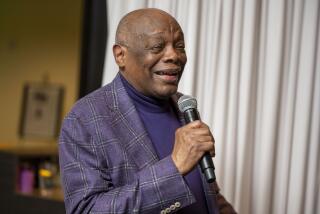Moriarty Was Like a Father With Advice, Young Says
- Share via
Former Assemblyman Bruce Young testified Friday that convicted political fixer W. Patrick Moriarty was like a friend and father to him and anything he did for the former Orange County fireworks magnate was based on that personal relationship, not money.
Young, facing mail fraud charges in Los Angeles Federal Court, said under cross-examination by Chief Assistant U.S. Atty. Richard Drooyan that for a time he met with Moriarty almost weekly, usually on Fridays, and Moriarty would present him with a list of questions and sometimes ask him to do things.
“What he was asking me to do was as a friend and a father,” Young said.
Young, 40, now a Sacramento lobbyist who served as a Democratic assemblyman from Norwalk from 1976 to 1984, said Moriarty knew that he was an orphan and, acting as his father, offered advice to repair Young’s broken marriage.
Gave Moriarty Advice
In turn, Young recalled that on one occasion he offered Moriarty, 55, advice when the former fireworks manufacturer complained that state Sen. H. L. Richardson (R-Glendora) had forced him to use the services of the senator’s direct mail company, Computer Caging Inc., in a campaign to win passage of a bill to prevent bans on non-explosive fireworks, described by their makers as “safe and sane.”
According to Young’s testimony, Moriarty, who is now serving a seven-year prison term for fraud and corruption, claimed Richardson had said that he would not vote for the fireworks measure unless Computer Caging was used to make surveys and formulate election plans.
Informed of Young’s courtroom statement, Richardson on Friday denied the charge, offering to take a lie detector test along with Young and charging that “they’re trying to get me for blowing the whistle on Moriarty.”
Providing Prostitutes
Richardson did not elaborate. But he was apparently referring to a 1984 incident when the Republican senator went to Orange County Dist. Atty. Cecil Hicks and reported that Moriarty had sought his (Richardson’s) help in stopping criminal investigators from looking into charges that Moriarty had provided prostitutes for state legislators. (Young and other elected officials received the services of prostitutes paid for by Moriarty, according to a variety of sources.)
According to Richardson, chronological material shows that he supported the fireworks bill from its inception and before Computer Caging did anything for Moriarty in connection with the proposed measure.
“There’s not a fact in the world to it (the charge that he had coerced Moriarty),” Richardson said. “Young is at the end of his rope and is grasping at anything to save himself. It’s a desperate statement by a desperate man.”
Charged With Fraud
Young is charged with 28 counts of mail fraud in connection with failure to report his income from Moriarty and from cable television companies in 1981 and 1982. The mail fraud charges stem from government allegations that Young was supporting legislation backed by Moriarty and other measures backed by cable interests while receiving the income. Young denied any wrongdoing in earlier testimony.
At Friday’s court session, Young offered a series of explanations for questions by Drooyan about his financial relationship with Moriarty and the activities of Young Thinking Inc., a firm formed by Young in 1981 to do consulting work.
The prosecutor asked whether Moriarty had paid for a $5,000 spa installed in Young’s house in 1981 and whether the spa had been subsequently reported on the Statement of Economic Interest required of Young as an assemblyman.
Young explained that he and his first wife had given Moriarty $50,000 to invest for them. But Moriarty, according to Young, refused to return the money, saying he would take $5,000 of it and have the spa installed by a company he owned.
Money Not Reported
Young never reported it because the money used to pay for the spa actually belonged to him and his wife. In later testimony, he testified that the $50,000 investment turned over to Moriarty was a rather “illusory” investment.
In other developments Friday, U.S. District Judge Dickran Tevrizian Jr. issued a temporary restraining order naming Hughes Aircraft and ordering the firm to continue to pay the salary of juror Judith Rogers.
The judge informed lawyers without jurors present that despite his best efforts Hughes had declined to continue to pay Rogers past a 21-day jury duty limit imposed by the company.
Citing a federal statute barring interference with a trial, Tevrizian ordered Hughes into court Tuesday for a hearing to decide whether he will issue a temporary injunction requiring Hughes to continue to pay Rogers throughout her jury service.
If Hughes violates the court’s order, Tevrizian said, he will issue an order for the company to show cause why it should not be held in contempt.
The issue, he said, is “who runs this court, Hughes Aircraft or the United States of America.”
More to Read
Sign up for Essential California
The most important California stories and recommendations in your inbox every morning.
You may occasionally receive promotional content from the Los Angeles Times.










